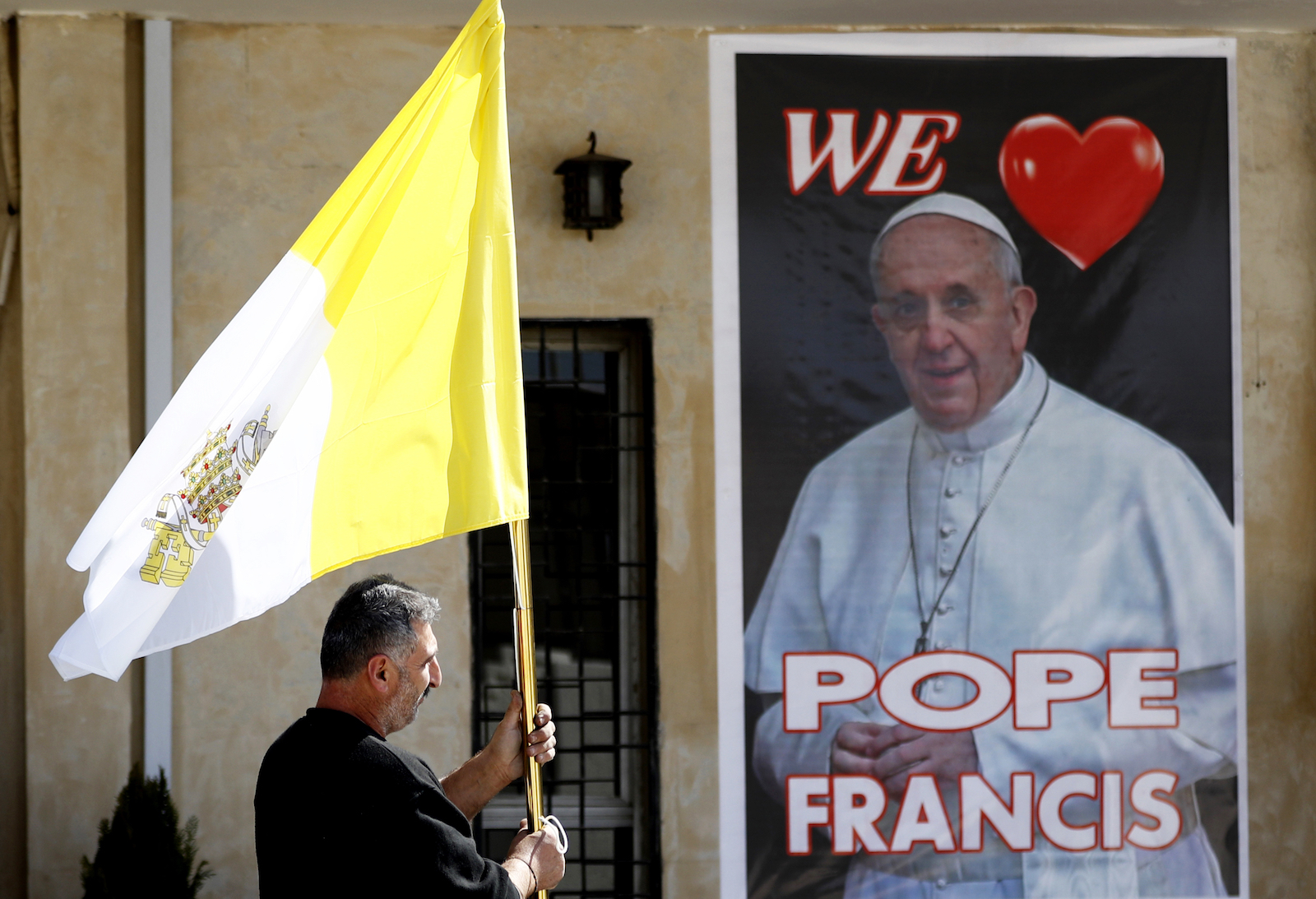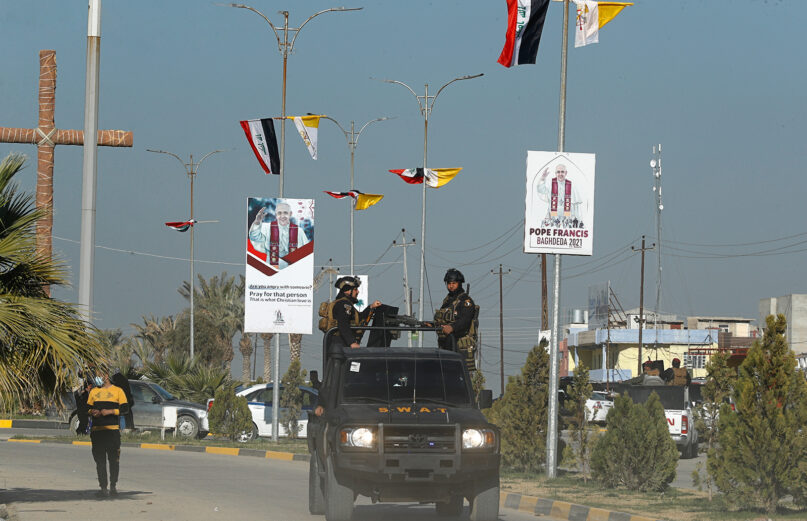VATICAN CITY (RNS) — Despite safety concerns due to recent terrorist attacks and COVID-19, Pope Francis is pushing ahead with his historic visit to Iraq this weekend, with hopes of promoting peaceful coexistence in the struggling Middle Eastern nation.
A flurry of attacks on U.S. bases in Iraq, coupled with missile attacks in February on areas the pope will visit, have led some Vatican observers to question the safety of the papal visit. Cases of COVID-19 have tripled to nearly 5,000 in the country in the past month.
While Francis and his entourage have been vaccinated against COVID-19, some journalists have questioned the wisdom of holding papal Masses and other appearances, which large crowds could turn into super-spreader events.
RELATED: ‘Not a good idea:’ Experts concerned about pope trip to Iraq
On Tuesday (March 2), Vatican spokesperson Matteo Bruni told reporters that the pope will not be encountering large crowds in Iraq as is usual during apostolic visits. He called Pope Francis’ determination to make the trip “an act of love for this land, this country, and its people.”
Admitting that acts of love “might be a bit extreme,” Bruni emphasized that the pope is being realistic. He will ride in a bulletproof car during the trip, casting aside the usual open “popemobile,” and social distancing will be enforced.
Francis “wishes to be near Christians and those who suffered and hopes the trip will open the door to the future for the Iraqi people,” Bruni said.
Iraqis return the sentiment, according to Davide Bernocchi, the country representative for Iraq for the charitable group Catholic Relief Services. “Iraqis understand that the pope is making a brave gesture by coming here,” Bernocchi told Religion News Service. “Given the safety situation and COVID, this visit means so much for this country and this people,” he added.
According to Bernocchi, the Iraqis’ enthusiasm for Pope Francis’ visit “is the greatest security element” to keep in mind, as many local religious groups are invested in the trip’s success. But he admitted that “the COVID situation in the country is not very good,” despite government attempts to impose stricter health measures ahead of the pope’s visit.

A Christian priest Places a poster of the Pope Francis and a Vatican flag during preparations for the Pope’s visit in Mar Youssif Church in Baghdad, Iraq, Friday, Feb. 26, 2021. (AP/Photo/Hadi Mizban)
On Friday (March 5), the pope will meet in Baghdad with religious and government authorities, including Iraqi Prime Minister Mustafa Al-Kadhimi. He will then visit Our Lady of Salvation, a Syriac Catholic church where 48 people were killed in a terrorist attack by jihadists in 2010.
The following day, the pope will join the Shia Muslim Grand Ayatollah Sayyid Ali Al-Husayni Al-Sistani in Najaf. It will be the first time any pope has met with a major Shia figure. In 2019, Francis co-signed a document on human fraternity with the Grand Imam of al-Azhar, Ahmad Al-Tayyeb, in Abu-Dhabi, the first joint declaration for peace and tolerance by a pope and a Sunni leader. It’s unclear whether Francis and Al-Sistani will sign a similar declaration.
Later he will go to the historic city of Ur, traditionally called the birthplace of the biblical patriarch Abraham, for an ecumenical meeting with other Iraqi religious communities.
Only 100 people will be permitted to accompany the pope to Ur, but Bruni said that number will include several members of the Iraqi Jewish community, which has dwindled in part due to persecution.
Upon his return to Baghdad, Francis will say Mass at the Chaldean Cathedral of St. Joseph, which will be the first time a Roman pontiff celebrates in the Chaldean rite.
For his last day, Sunday (March 7), the pope will visit the majority-Christian settlements of Erbil, Mosul and Qaraqosh, on the Nineveh Plains, where some of the world’s oldest Christian communities have clung desperately to their identity despite waves of war, violence and bloodshed.
Before 2013, there were roughly 1.4 million Christians living in this area, but following the rise of the Islamic State in the region the number fell to just over 300,000. Those who braved the political and social instability in Iraq are now left with a struggling economy and discrimination.
“Christians represent a traumatized community, and they need someone to show them the way toward the future once more,” Bernocchi, who has been living side by side with Christian communities in the Middle East for the past nine years, said.
In Mosul, those who witnessed the violence against Christian communities in the area will have an opportunity to share their experiences and pray with the pontiff.
In the afternoon, Francis will visit the “Franso Hariri” stadium in Erbil, which will host the largest crowd of the trip — roughly 10,000 people in a stadium designed for over 30,000 people. This moment will be the last opportunity for the pontiff to make an appeal to the Iraqi people before leaving for the Vatican the next morning.
This article has been updated. A previous version of this story errouneously stated that Pope Francis will meet the Grand Ayatollah in the city of Ur.
RELATED: For Iraqi priest, pope’s visit raises hope of restored trust between Christians and Muslims





